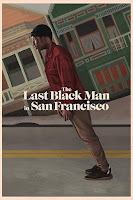The Last Black Man in San Francisco - See & Feel
Quick Thoughts: The Last Black Man in San Francisco (2019)
Two friends attempt to reclaim an old home.
I went into The Last Black Man in San Francisco hopefully, but without a clue as to what the film was about. At first, I thought this would be similar to 2018's Sorry To Bother You. And whilst both share similar traits - a focus on racial politics from a black-American perspective dramatised uncannily and with traces of absurdist sci-fi - the films are highly distinct from one another. Where Sorry To Bother You interrogates thought and motive, testing its character from an exterior position, The Last Black Man in San Francisco wholly moves into its character's psychology. Such is what lends this its queerness, but is maybe the most difficult aspect of this film. As we see this carefully cultivated world as our two main character do, we come to understand that they struggle with attachment and self-identification. However, their neuroses and strangeness are never fully integrated into the logic of the film, which is to say that we never come to understand the full relationship between character psychology and world. To expand slightly, this is about a man who believes his grandfather built a grand townhouse in the upper-class heart of San Francisco, and that his family has a birth-right to it. This is then a film about attachment, but quickly it becomes apparent that this attachment is not healthy, nor particularly sane. Alas, the strangeness of our main character's attachment is never properly addressed. There is then no moment in which his reality truly shatters. So though his perspective shifts over the course of the film, I did not find the dramatisation and representation of the world shift in agreement with this. Such cultivated a slightly incongruous tone that alienates rather than pulls you into the narrative's complexities and mysteries. What is more, the lack of clarity does not allow the full humanity of our main character to be expressed. Therefore, his cathartic transformations fail to exude anything of proper potency.
With all that said, I found The Last Black Man in San Francisco to be an intriguing film. I see in it much that could be re-evaluated and closer observed in a re-watch. But, following this first watch, I have to admit problems in the relationship between character, world, tone and perspective that left me somewhat unengaged by the film.
Two friends attempt to reclaim an old home.
I went into The Last Black Man in San Francisco hopefully, but without a clue as to what the film was about. At first, I thought this would be similar to 2018's Sorry To Bother You. And whilst both share similar traits - a focus on racial politics from a black-American perspective dramatised uncannily and with traces of absurdist sci-fi - the films are highly distinct from one another. Where Sorry To Bother You interrogates thought and motive, testing its character from an exterior position, The Last Black Man in San Francisco wholly moves into its character's psychology. Such is what lends this its queerness, but is maybe the most difficult aspect of this film. As we see this carefully cultivated world as our two main character do, we come to understand that they struggle with attachment and self-identification. However, their neuroses and strangeness are never fully integrated into the logic of the film, which is to say that we never come to understand the full relationship between character psychology and world. To expand slightly, this is about a man who believes his grandfather built a grand townhouse in the upper-class heart of San Francisco, and that his family has a birth-right to it. This is then a film about attachment, but quickly it becomes apparent that this attachment is not healthy, nor particularly sane. Alas, the strangeness of our main character's attachment is never properly addressed. There is then no moment in which his reality truly shatters. So though his perspective shifts over the course of the film, I did not find the dramatisation and representation of the world shift in agreement with this. Such cultivated a slightly incongruous tone that alienates rather than pulls you into the narrative's complexities and mysteries. What is more, the lack of clarity does not allow the full humanity of our main character to be expressed. Therefore, his cathartic transformations fail to exude anything of proper potency.
With all that said, I found The Last Black Man in San Francisco to be an intriguing film. I see in it much that could be re-evaluated and closer observed in a re-watch. But, following this first watch, I have to admit problems in the relationship between character, world, tone and perspective that left me somewhat unengaged by the film.










